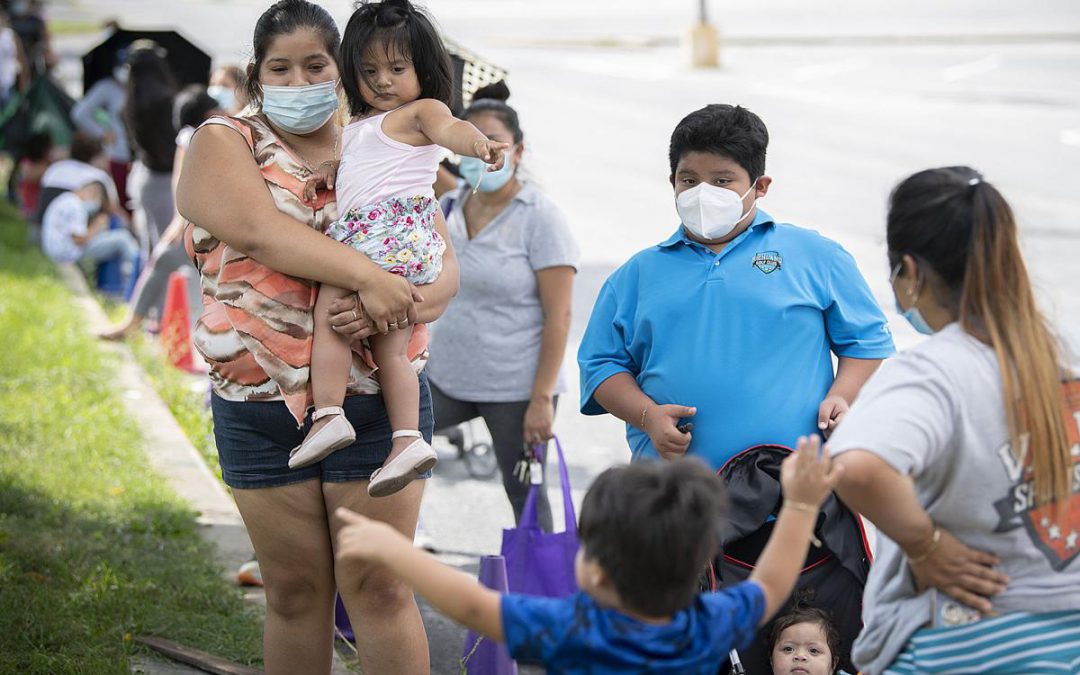When county and city leaders extended Frederick’s $3 million emergency renters’ assistance program in mid-July after receiving fewer applications than expected, some hoped it was a sign that residents were faring better than anticipated during the pandemic. But as COVID-19 continues, local organizers are saying some of the county’s most vulnerable residents, particularly immigrants, are falling through the cracks and are urging county and city leaders to provide a general cash assistance fund that would give residents the flexibility to use that money to meet their unique needs.
“Some people were able to get help from the rental assistance… but not all of them are taking advantage of this, number one because not all of them have all the requirements they are asking [for],” said Jazmin Schiano Di Cola, an organizer with the RISE Coalition of Western Maryland, an immigrant support and empowerment group.
The emergency renters’ assistance program, which was announced in early July, was designed to help residents meet their rent payments and avoid eviction during the pandemic. Among the program’s requirements, applicants must provide a copy of their current lease or rental agreement signed by their landlord and documentation proving they’ve experienced COVID-related hardship and loss of income during the pandemic. While the program is open to all residents regardless of their citizenship status, for Frederick’s undocumented immigrant population, meeting all the requirements to prove their eligibility has been especially difficult, Schiano Di Cola said.
Amid the pandemic related layoffs and families nationwide struggling to pay rent, RISE has worked with many immigrant families who live informally with relatives and can’t prove their eligibility for the renters’ assistance program despite facing financial hardships, as they lack a formally signed contract with the building’s landlord. According to Schiano Di Cola, a cash assistance fund would not be exclusive to housing-related financial needs, nor would it require residents to prove why they need the money. Instead, residents would be able to use the cash on whatever expenses, rent or otherwise, that they may need covered at the time.
“If we’re able to provide this cash assistance, there’s some flexibility there,” Schiano Di Cola said. “We know they’re going through a lot of hardship. That money is not going to make them rich, it’s going to help them a little bit [more].”
For Josefina Romero, an undocumented single mom of three in Frederick, rent is only one of several expenses a cash assistance fund would help her with.
Romero, who was four months behind on rent after being furloughed from her job amid COVID-19, was able to pay back roughly half of her rent with help from Frederick’s renters’ assistance program. Yet she is still trying to make up for the other half, and with only part-time wages, she’s struggling.
Romero works 15 hours a week at a local restaurant and makes $11.50 an hour. Her paychecks come out to roughly $275 every two weeks, but with her youngest child still an infant, she said she spends around $200 a month on baby formula.
In mid-August, Schiano Di Cola met with county executive Jan Gardner to discuss creating a county-wide cash assistance program, using the available funds from the emergency renters’ assistance program. According to Gardner, roughly $900,000 to $1 million has been requested from the $3 million program so far, but due to federal government regulations, the rest of the money cannot be funneled into a general cash assistance fund. Instead, the county has tried to create additional programs to fulfill the widespread needs of residents, such as its childcare and utility grant programs.
“They have a good start,” Schiano Di Cola said of the county leaders’ efforts to respond to the unique needs of Frederick’s immigrant population. “But there’s more work to be done. There’s more active listening to be done and there’s more that they need to learn.”
While county leaders, residents and nonprofit organizations are stepping up to meet the needs of Frederick residents, Gardner said the local government is simultaneously facing a lack of revenue as a result of the ongoing pandemic. This has made it more difficult to create additional financial aid programs.
“We’re all experiencing a reduction in tax revenue related to the fact that the economy has slowed down,” said Gardner. “It’s very hard to add things coming from our general fund cash because we’re trying to support the essential services that we normally provide.”
Addressing the needs of those in Frederick has become a responsibility many across the county have undertaken amid COVID-19. While Romero attempts to save up enough money to pay the rest of her rent while also covering basic expenses for her children, a local free food depository has been a lifeboat for her and her family.
Twice a week, Romero is able to pick up groceries, such as rice, beans and vegetables, through I Believe In Me Inc.’s free food distribution. IBM is a local organization focused on mentoring underprivileged youth in the local community. According to the organization’s founder, Aje Hill, when COVID-19 hit and children had to turn to remote learning, he and other leaders would drive around to drop off meals to their mentees. It was during these drop-offs that he noticed other residents throughout the community in need of food and organized around 47 partnerships with local nonprofits and organizations to provide groceries to those in need.
“If you try to do something alone, you don’t win,” Hill said. “But when you do it together, you’re guaranteed to win, so it’s been us coming together, providing hope into the community.”


